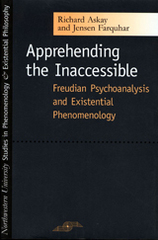
With its unique perspective on Freud's work, Apprehending the Inaccessible puts readers in a better position to appreciate his contributions and evaluate the relationship between his and other philosophical world views. The authors, both of whom have extensive backgrounds in philosophy and psychology, present balanced critical analyses of crucial developments in, for example, the evolution of the Freudian notion of the unconscious, and the engagement of existential phenomenology with Freudian psychoanalysis. Askay and Farquhar then consider—often for the first time—individual thinkers' reflections on and interpretations of Freud, ranging from the primary figures in existential phenomenology to the most prominent figures in the existential psychoanalytic movement. Even as their work offers a new approach to Freudian thought, it reasserts the importance of alternative views found in existential phenomenology as those views pertain to psychoanalysis and the question of apprehending the inaccessible.


The first modern biography of Cotton Mather, David Levin's narrative makes clear the development of Mather's character and experience during forty years in which he was able to identify his own personal life with the fortunes of Congregational New England. On his relationship to his eminent father, the Puritan divine and Massachusetts statesman, Increase Mather, the history and cure of his stammer, his experience as a child prodigy at Harvard, his religious conversion, his vision of an angel, his leadership in the Glorious Revolution in Massachusetts, his encounters with the Devil during the witchcraft crises in Boston and Salem—on all these matters and more, Levin's account provides new interpretations that make this permanently controversial and legendary figure accessible and comprehensible in human as well as historical terms.
It is the triumph of Levin's biography that his subject's personal and literary lives are more closely woven into the fabric of the political history of his place and time than in any previous study. Mather's character, though seen sympathetically, develops in a narrative that deliberately avoids the constraints of prosecution and defense.
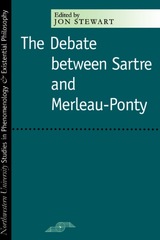
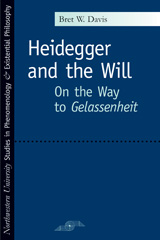
Moreover, the book demonstrates why popular critical interpretations of Heidegger's relation to the will are untenable, how his so-called "turn" is not a simple "turnaround" from voluntarism to passivism. Davis explains why the later Heidegger's key notions of "non-willing" and "Gelassenheit" do not imply a mere abandonment of human action; rather, they are signposts in a search for an other way of being, a "higher activity" beyond the horizon of the will. While elucidating this search, his work also provides a critical look at the ambiguities, tensions, and inconsistencies of Heidegger's project, and does so in a way that allows us to follow the inner logic of the philosopher's struggles. As meticulous as it is bold, this comprehensive reinterpretation will change the way we think about Heidegger's politics and about the thrust of his philosophy as a whole.
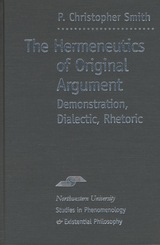
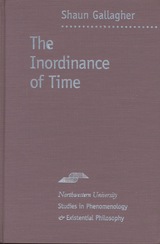
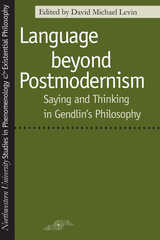
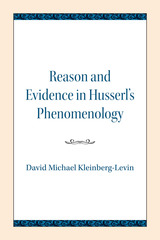
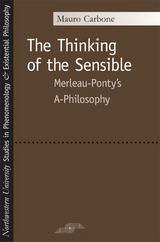
An original and innovative interpretation of the ontology of Merleau-Ponty--and themselves a significant contribution to the field of Continental thought--these essays constitute a sustained exploration of what Merleau-Ponty detected, and greeted, as a "mutation within the relations of man and Being," which would provide him with the basis for a new idea of philosophy or "a-philosophy." In lucid, often elegant terms, Carbone analyzes key elements of Merleau-Ponty's thought in relation to Proust's Recherche, Hegel's Phenomenology of Spirit, the new biology of Von Uexküll, Rimbaud's Lettre du voyant, and Heidegger's conception of "letting-be." His work clearly demonstrates the vitality of Merleau-Ponty's late revolutionary philosophy by following its most salient, previously unexplored paths. This is essential reading for any scholar with an interest in Merleau-Ponty, in the questions of embodiment, temporality and Nature, or in the possibility of philosophy today.
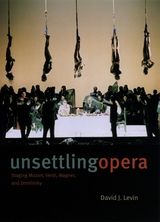
What happens when operas that are comfortably ensconced in the canon are thoroughly rethought and radically recast on stage? What does a staging do to our understanding of an opera, and of opera generally? While a stage production can disrupt a work that was thought to be established, David J. Levin here argues that the genre of opera is itself unsettled, and that the performance of operas, at its best, clarifies this condition by bringing opera’s restlessness and volatility to life.
Unsettling Opera explores a variety of fields, considering questions of operatic textuality, dramaturgical practice, and performance theory. Levin opens with a brief history of opera production, opera studies, and dramatic composition, and goes on to consider in detail various productions of the works of Wagner, Mozart, Verdi, and Alexander Zemlinsky. Ultimately, the book seeks to initiate a dialogue between scholars of music, literature, and performance by addressing questions raised in each field in a manner that influences them all.
READERS
Browse our collection.
PUBLISHERS
See BiblioVault's publisher services.
STUDENT SERVICES
Files for college accessibility offices.
UChicago Accessibility Resources
home | accessibility | search | about | contact us
BiblioVault ® 2001 - 2024
The University of Chicago Press









